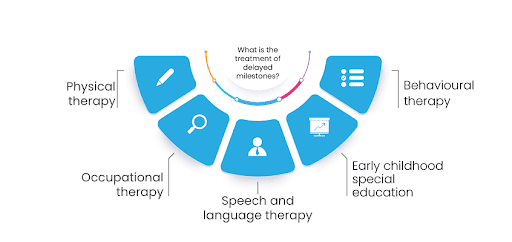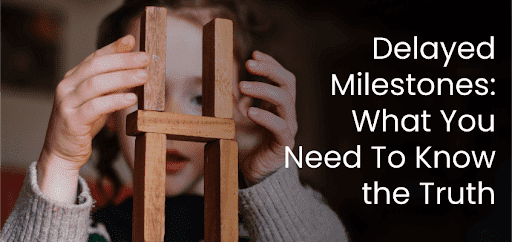Introduction
The term delayed milestones can be terrifying for parents when they first realise their child may have a developmental delay. This article will help you get all the crucial information you need if you have a kid with delayed milestones. It will thoroughly discuss delayed milestones’ causes, symptoms, and probable treatment processes. Each child with delayed milestones grows and learns differently. This article will help you get a firm grip on this topic so that you can help your child reach their full potential.
What are delayed milestones?
Milestones are the predicted points when your child reaches a crucial stage in their development, like talking, walking etc. A delayed milestone is when the child has not reached an expected developmental stage at a predicted age. It also means that the child has not gained the characteristic developmental or age-specific skills at their age compared to others of the same age group.
Such delays might happen in your child’s motor function, cognitive capability, speech, language, social skills, etc. Another term, global developmental delay, means that your child has significant delays in two or more of such areas of development.
What is involved in delayed milestones?
You need to understand that development is different from your child’s growth. Development means how your child can perform more complex things along with their stage of life. But growth means your child is getting bigger. In case of normal development, the skills involved are;
- Gross motor skills
- Fine motor skills
- Cognitive skills
- Social skills
What are the causes of delayed milestones?
There are several causes of delayed milestones diagnosed to date. Delayed milestones causes can be genetic predispositions, complications during pregnancy or birth, premature birth etc. Moreover, early infancy or childhood complications, like significant infection or head injury, can cause delayed milestones. However, in most cases, there may be no identifiable causes.
Each child learns to crawl, walk or talk at different speeds. But when a child falls significantly far behind those milestones than other kids, they may have crucial reasons behind that. Like,
- Premature birth
- Malnutrition
- Genetic or hereditary conditions like down syndrome, muscular dystrophy
- Metabolic disorders like phenylketonuria (PKU)
- Impaired eyesight
- Impaired hearing
- Smoking, drug or alcohol abuse during pregnancy
- Lead poisoning
- Accidental injuries before or after birth
- Lack of oxygen during delivery
- Specific brain trauma, like shaken baby syndrome
- Psychosocial trauma, like post-traumatic stress disorder (P.T.S.D.)
- Poor birth environment
What is the treatment of delayed milestones?

Parents should understand that each child is unique. There is a wide range of normal development found among children. Studies show that most cases of delayed milestones in children are severe and eventually catch up with others.
However, if a child has severe delays, they can also make significant improvements if they get diagnosed early with their treatment starting as soon as possible. Here the key is to intervene early in the child’s developmental stage.
Although no delayed milestones treatment or cure is available for such affected kids, few therapies explicitly directed to the area of delay may turn effective. These therapies help children immensely to catch up to their peers. A few of these therapies are:
-
Physical therapy:
It is helpful for children with delays in gross motor skills.
-
Occupational therapy:
Occupational therapy helps address issues with fine motor skills, sensory processing, and self-help matters.
-
Speech and language therapy:
Speech and language therapy helps address problems in understanding, producing language and making speech sounds.
-
Early childhood special education:
This kind of education motivates early developmental skills, such as playing.
-
Behavioural
therapy helps children with behavioural difficulties that affect their socially appropriate behaviours.
What are the symptoms of delayed milestones?
There are no specific symptoms to look for in delayed milestones. However, several signs can help the parents understand their child’s development stages.
Such different signs and symptoms generally depend upon the specific characteristics of each case. Sometimes characters are present as early as the infant stage. However, they may not be noticeable in some cases until the child reaches school age. Some of the most common signs and delayed milestones symptoms are:
- Slower learning and development compared to children of the same period.
- Significant delay in crawling, rolling over, walking and sitting up
- Difficulty in communication or socialisation with others
- Delayed talking or difficulty in talking
- Poor memory
- Failure to connect actions with consequences
- Poor problem-solving or logical thinking capability
- Difficulty in learning at school
- Inability to do everyday chores, such as getting to dress and using the bathroom without anyone’s help
- Lower than average scores on I.Q. tests
- If you find any of the abovementioned symptoms in your child, there may be an underlying medical reason. Early identification and then treatment of that particular condition may improve your child’s developmental skills to a great extent.
Conclusion
As delayed milestones can significantly affect your child’s development, they must receive early diagnosis and proper treatment. It will help your child reach the right milestones at the correct times. Physiotherapy is known to help speed up pediatric delayed milestones.
You can only trust an experienced paediatrician, developmental paediatrician or child developmental specialist to diagnose delayed milestones following strict developmental guidelines. In general, parents, grandparents or close relatives are the ones to notice the delay first.
Unfortunately, in many cases, parents consider any developmental delay a body weakness, which is not always true. Due to such incidences of misconception about delayed milestones, many children, unfortunately, get deprived of early intervention benefits.
It would help to remember that delayed milestones are symptoms, not the actual diagnosis. So, a proper diagnosis should be made along with therapeutic interventions to get a clear picture of your child’s developmental profile and, therefore, can employ appropriate treatment approaches towards your child.









